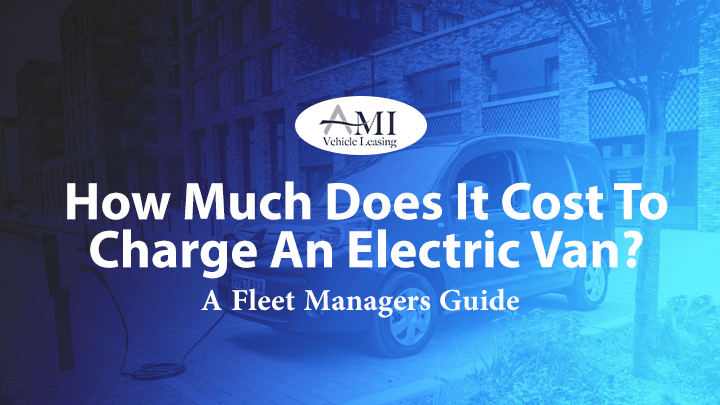How Much Does It Cost To Charge An Electric Van?

You see the cost of diesel at the pump, in the news, on receipts; gauging how much it costs to run a diesel van isn’t too complicated.
But . . . could you do the same for an electric van?
How much power is needed to charge a fleet of 33 kwh batteries for 10 hours a day, 365 days a year? That’s far more tricky!
Calculate The Cost Of Running An Electric Van?
Firstly, to figure out the cost to charge an electric van, you need to calculate your weekly mileage:
Our example is someone who works 5 day week with an average mileage per annum of 15,000
15,000 miles / 52 weeks (Divide your miles per annum by 52)
288.46 (Round it to the nearest whole number)
288 miles per week.
So… now you know your weekly mileage, what’s the next step to find the cost to charge an electric van? How much electricity is needed for a vehicle to cover that range?
Example Vehicle – (Electric) Kangoo Van Z.E. 33
If you’re a homeowner you’ll be more than aware energy tariffs don’t stay fixed for long. Electricity prices can also differ depending on geography.
In this example, let’s say you are using a domestic charging point at 12.50 pence per kwh.
The lithium ion battery inside the Kangoo Z.E can hold 33 kwh of energy in a single charge.
So here’s how to calculate the cost to fully charge the battery
33kwh x 0.125 pence = £4.13
Renault state that the 33 kwh battery delivers a 170 mile range on the road. So an estimate to charge the battery for a 288 mile range works out like this:
£4.13 / 170 miles = 0.024 (pence per mile)
0.024 X 288 miles = £6.91
288 miles = £6.91
How Does That Compare To A Diesel Model?
To help you understand the cost to charge an electric van, we’ll compare it with the cost of running a diesel model.
(Diesel) Kangoo Van ENERGY dCi 75
Renault claim the diesel Kangoo is capable of 65.7 mpg.
Let’s take the cost of diesel at £1.32 per litre.
1 litre = 0.264172 Gallons
1 / 0.264 = 3.78
(1 Gallon = 3.78 Litres)
£1.32 X 3.78 = £4.98
65.7 miles = £4.98
£ 4.98 / 65.7 miles = 0.076 pence per mile
£0.076 X 288 = £21.89
288 miles = £21.89
Which Is Cheaper: Diesel Or Electric?

It is clear that the electric van is much cheaper to run; fueling costs almost a third of that expected in the diesel equivalent.
What Else Do You Need To Consider?
Plug-In Grant
Offered until October 2018, the government plug-in car grant is designed to promote interest in electric vehicles in the UK.
Any vans that have the capability to travel 10 miles completely on electric power, and have CO2 emissions of less than 75g/km are included in the scheme.
The grant will pay 20% of the purchase price (up to a maximum of £8,000) for the following vans:
- BD Otomotiv eTraffic
- BD Otomotiv eDucato
- Citroen Berlingo
- Mitsubishi Outlander Commercial
- Nissan e-NV200 (cargo van)
- Peugeot ePartner
- Renault Kangoo ZE
- LDV EV80 van
- LDV EV80 chassis cab
Electric Vehicle Home Charge Scheme
The electric vehicle home charge scheme grants 75% discount up to £500 (inc. VAT.) on home charger installations.
From a domestic 3 pin plug, the Renault Z.E is estimated to charge from 0% – 100% in around 17 hours.
Home chargers can improve charging speed drastically. Here’s an example from Pod Point. However, do bare in mind that not all vehicles are compatible with charging at faster speeds.

Logistics
Are small ranges and lengthy charging times a logistical challenge you could tackle?
The diesel Kangoo range have fuel tanks 50-60 litres in capacity. At 65.7mpg, that means a full tank should have no problems handling 750 miles.
In our Kangoo Z.E example, the 170 mile range is the maximum in test conditions and you’d be very hard pushed to recreate this on the road.
Tax
Under current legislation, vehicles capable of zero CO2 emissions are exempt from paying annual road tax.
Servicing
In layman’s terms, less moving parts…less can go wrong. (KeeResources 2017) suggests that electric cars can be around 70% cheaper to maintain compared to petrol or diesel-powered alternatives.
Also many manufacturers offer long guarantees on battery performance; Renault guarantee batteries to not deteriorate below 70% of its original capacity for 5 years / 60,000 miles.
Want To Know More About Commercial Electric Vehicles?
If you would like to find out more information about electric vehicles, contact our team.

Comments (0)
Leave Comment